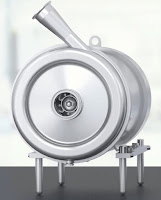 |
Sanitary Coriolis flow sensor
with 15 RA / 230 Grit finish
on wetted parts.
(Courtesy of Siemens) |
In
sanitary applications, the finish and the material must be designed for easy and reliable cleaning and sanitation. For decades agencies have required sanitary finishes to comply to minimum standards. But now, many food, Biotech, and Pharma companies are going beyond the minimum regulations and providing high-end finishes because of the reduced sanitation time and reduced bacteria growth these finishes facilitate.
Sanitary applications mandate that stainless steel equipment have a sanitary finish. In very general terms, “sanitary finish” means a smooth, scratch-free, non-corrosive finish. But it’s much more than that. To qualify the finish more accurately, there are two primary terms used:
Roughness Average, or RA: A standard for an average of the peaks and valleys of the metal’s surface, measured in microinches or micrometers. The lower the RA, the smoother the finish.
Grit: The size of the abrasive used in the metal polishing process. Higher grit numbers are associated with higher polishing.
For
process control equipment manufacturers, achieving higher-end finishes is not an easy proposition. Providing better finishes requires experience and controlled processes for quality fabrication, as well as possible tooling and production floor changes. Working inside sanitary requirements requires careful handling to prevent contamination from the manufacturing environment. Not all process instrument manufacturers are capable of providing the required environment.
A Coriolis Flowmeter with 15 RA/230 Grit for Biotech and Pharma
Siemens is currently offering a 15 RA/230 Grit surface finish for the FCS400 Coriolis flow sensor internal wetted-tube parts as a special, and will soon be offering it as a standard.
A Coriolis sensor, with such a high end finish, is very attractive to many "clean" industries including chromatography, blood plasma fractioning, chemical synthesis phases, Active Pharmaceutical Ingredient (API) extraction/fermentation and purification, formulation, and purified API.
Biotech and Pharma manufacturers, in particular, are poised to take advantage of the enhanced
15 RA/230 Grit finish coupled with the inherent benefits of the
FCS400 Coriolis flow sensor, namely:
- Accurate measurement across the entire range
- Zero internal fabrication joints and self-draining design
- All metal surfaces eliminate risks from particulates from the breakdown of synthetic materials
- No internal fluids to leak into the process
- A direct mass flow rate/ and total
For more information, contact:
Ives Equipment
www.ivesequipment.com
(877) 768-1600
 Alfa Laval UltraPure pumps are specifically designed for the toughest, most demanding pharmaceutical applications. Their design pays a high level of attention to hygiene and repeatability to reduce the risk of contamination and delivers maximum energy efficiency, a reduced C02 footprint, higher yields and increased uptime.
Alfa Laval UltraPure pumps are specifically designed for the toughest, most demanding pharmaceutical applications. Their design pays a high level of attention to hygiene and repeatability to reduce the risk of contamination and delivers maximum energy efficiency, a reduced C02 footprint, higher yields and increased uptime.
